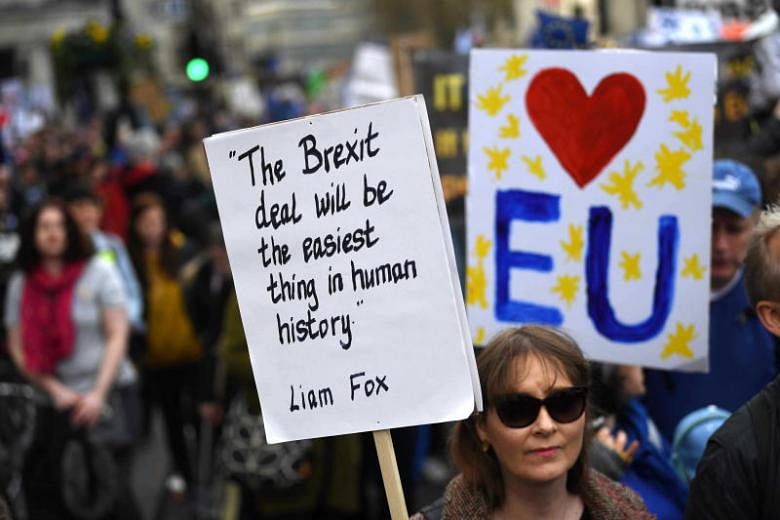LONDON (AFP) - With British MPs set to vote on finding a way forward on Brexit, various outcomes are possible.
Britain is left with four general directions: back a deal, go for no deal, a long delay or stopping Brexit.
Those options could entail various courses of action, including Prime Minister Theresa May's resignation and a general election.
1. LEAVE WITH DEAL ON MAY 22
British MPs have twice rejected by overwhelming margins a draft divorce agreement struck between London and Brussels in November last year.
A new vote on the agreement, which allows for a long transition period and time for trade ties to be negotiated, will only be brought forward if it has sufficient support to pass.
If MPs overcome numerous objections from "Brexiteers" and "Remainers" and approve the deal, Britain will leave the European Union on May 22.
2. NO-DEAL BREXIT ON APRIL 12 OR LATER
If the deal is not passed, and no other course of action can be agreed, the default option would be that Britain leaves without a deal.
According to a European official that hard deadline would be midnight Brussels time on April 12 but French President Emmanuel Macron said this was not "necessarily" the case and a later date for no-deal Brexit could be agreed.
Mrs May has not ruled out the possibility of a no-deal, though MPs have voted against ever leaving without a deal.
3. NEW PLAN, LONG BREXIT DELAY
MPs are set to hold "indicative votes" this week on a range of alternative Brexit options that could rip up the withdrawal agreement and remove some of Mrs May's red lines, such as ending freedom of movement.
If a course of action can be agreed, Britain could ask EU leaders for another, much longer delay by April 12.
That would mean it would have to hold European Parliament elections at the end of May.
The European Commission, the EU's executive arm, has advised EU leaders that this longer extension should be at least until the end of 2019 and possibly much longer to allow for a proper change in Brexit strategy.
The longer delay would allow time for a change in prime minister if Mrs May quits.
It would also open up other options such as holding a general election or, perhaps, a second referendum.
Britain's Electoral Commission has budgeted for European elections and could hold them at short notice but Mrs May has said it would be "unacceptable".
"I don't believe it's right to be in a situation of holding European parliamentary elections three years on from people having voted to leave the EU," she said.
4. STOP BREXIT
This is by far the least likely option but is still a possibility.
An estimated one million people flooded London on Saturday (March 23) calling for a second referendum on EU membership. An online petition asking the government to end the Brexit process has garnered more than 5.5 million signatures since last Wednesday (March 20).
The European Court of Justice has ruled that Britain could unilaterally revoke its Article 50 notification - the formal procedure for leaving the EU.
NEW PM, ELECTIONS?
Within these four general pathways, there is the possibility that Mrs May might resign or a general election could be triggered.
1. MAY RESIGNS
The price of getting rebel Conservatives to support Mrs May's deal could be her stepping down as prime minister.
She is opposed to cancelling Brexit, a longer extension, or a Brexit solution that runs contrary to the Conservative manifesto.
She has also said she does not intend to lead the Conservatives into the next general election. That is slated for 2022 but could happen within weeks.
Several contenders have been mooted to replace Mrs May, among them Mr David Lidington, Mr Michael Gove, Mr Boris Johnson, Mr Jeremy Hunt, Mr Sajid Javid and Mr Dominic Raab.
2. GENERAL ELECTION
If parliament comes up with an option that the government finds impossible to deliver or runs against the Conservative manifesto, a general election could be the only option left.
A general election could come through the government losing a confidence vote in parliament, or by the government seizing the initiative and calling a snap poll.
It would reset parliament and a clear outcome with a government majority could result in a much stronger administration.
However, for both major parties, finding a clear Brexit manifesto that all their MPs can commit to could prove a challenge.











